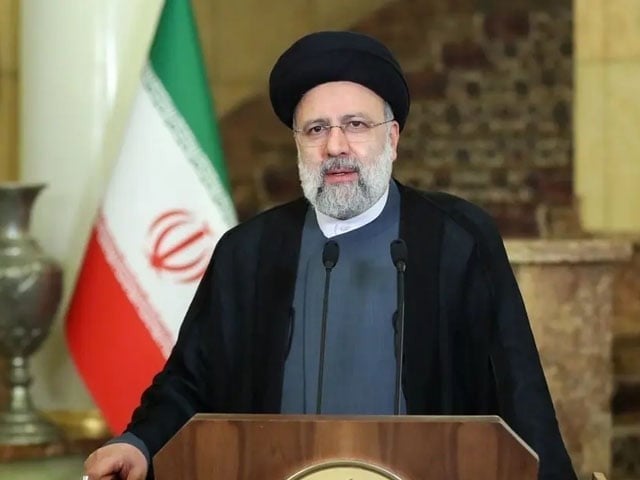• Iranian president visits Lahore, Karachi; says ‘no power on Earth’ can hurt Pak-Iran ties
• Says Israel will be ‘annihilated’ if it attacks Iran, lauds Islamabad’s stance against Tel Aviv
• US warns Pakistan to keep ‘sanctions’ in mind amid trade talks with Iran
KARACHI / LAHORE: Tehran is ready to exchange its prowess in industry, science, and technology with Pakistan, Iranian President Ebrahim Raisi said after visiting Lahore and Karachi on Tuesday amid strict security during his three-day trip to the country.
Speaking at a ceremony at the Chief Minister House in Karachi, he said Iran made strides in these fields despite “unfavourable conditions” and was ready to exchange this knowledge with Islamabad.
“I am here with a message of peace and prosperity for the Pakistani nation from the people of Iran and its leadership,” he said, adding, “The governments on both sides are willing to remove all obstacles to expanding trade between the two countries and in this regard, several options were discussed [in his recent meetings Pakistani leadership].”
The visiting dignitary said a strong trade partnership would further strengthen Iran-Pakistan relations, adding that no power on Earth “can affect the historical ties between the two countries”.
He referred to the fresh commitment agreed by the two countries to increase their annual trade volume to $10 billion over the next five years, calling it the “best opportunity” to cement ties across different fields.
‘Routine life disrupted’
At the Karachi airport, President Raisi was received by Sindh Governor Kamran Tessori, CM Murad Ali Shah, provincial ministers, and Iranian diplomats stationed in the city. With a large motorcade, the Iranian president was then driven to the Quaid-i-Azam mausoleum where he offered Fateha.

(LEFT) Iranian President Dr Seyyed Ebrahim Raisi arrives at Mazar-i-Quaid with Sindh Chief Minister Murad Ali Shah and Governor Kamran Tessori during his visit to Karachi; after he met Punjab CM Maryam Nawaz in Lahore, on Tuesday.
Ahead of his visit, the provincial government had closed all major road links, suspended cellular services in many city districts, and deployed a heavy contingency of police and Rangers all across the metropolis. Since the authorities had already announced a public holiday, business activities were badly hit by the security arrangements convincing traders, transporters, and other segments of the community to stay away from routine operations The arrangements “almost paralysed” the entire traffic system of the city as all major arteries connecting to major thoroughfares were blocked with containers. With helicopters hovering over the city throughout the day as part of security arrangements, almost 4,000 policemen backed by the paramilitary Pakistan Rangers squad were mobilised on the ground to ensure “peace and tranquillity and security of the foreign dignitaries”.
Lahore visit
President Raisi arrived in the port city after visiting Lahore, where Punjab Chief Minister Maryam Nawaz received him. The Iranian president appreciated the “cultural contributions” and “beauty” of the provincial capital of Punjab.
Here, President Raisi expressed a desire for enhanced people-to-people contacts with the people of Pakistan, as CM Maryam said that the government wanted to take exchanges with Iran in industry and agriculture to “new heights”.
In a meeting with President Raisi and First Lady Jamila Alamul Huda at the Governor’s House, CM Maryam said, “We are willing to work with Iran on economic projects to eradicate poverty. We will also welcome Iran’s investment in Punjab’s value-added livestock market.”
During his short stay in Lahore, he visited the mausoleum of Allama Iqbal, Governor’s House, and Government College University. Mr Raisi said: “I do not feel like a stranger at all. There are special emotions and connections with Pakistani people that keep the two nations connected. I wanted that a public rally be held so I could address the public but due to some reasons, the conditionalities were such that it could not be made possible.”
Mr Raisi further said on behalf of the supreme leader of Iran, “I say my greetings to the people of Pakistan and Lahore.” He said he appreciated the revolutionary spirit present in the people here, adding that Allama Iqbal was “an extremely important personality for Iran as he was a very inspirational person”.
‘Zionist regime’
He also praised Pakistan for taking a strong stance against Zionist forces. “I praise the Pakistani people and government for the stance taken with us (Iran) in a strong manner against Zionist forces,” he said.
Punjab Governor Balighur Rehman also held a meeting with the Iranian president at the Governor’s House.
According to Reuters, which quoted Iran’s official IRNA news agency, the Iranian president said that an Israeli attack on Iranian territory would bring about a complete change of “circumstances”.
“Raisi, who is visiting Pakistan, was quoted as saying such an attack could possibly result in there be nothing left of the ‘Zionist regime’,” according to Reuters.
‘Beware of sanctions’
The US State Department, separately, warned that anyone considering business deals with Iran should be aware of the potential risks of US sanctions, as Washington ‘forbids’ commercial ties with Tehran.
“Let me say broadly we advise anyone considering business deals with Iran to be aware of the potential risk of sanctions,” said the department’s Principal Deputy Spokesperson Vedant Patel, when asked about efforts to expand trade ties between Pakistan and Iran.
“But ultimately, the government of Pakistan can speak to their own foreign policy pursuits,” the US official added.
At Tuesday’s briefing, Mr Patel also spoke about a US decision last week to sanction three Chinese and one Belarusian firm for allegedly supplying missile components to Pakistan. “The sanctions were made because these were entities that were proliferators of weapons of mass destruction and because of the means of their delivery,” he said.

